. 111 •01111,se 1S a
Page 124
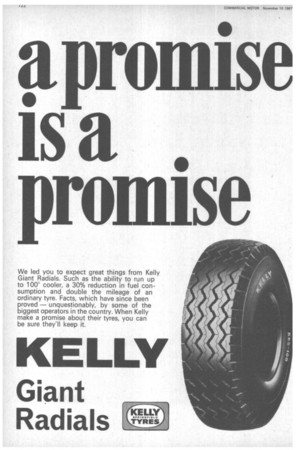
Page 125
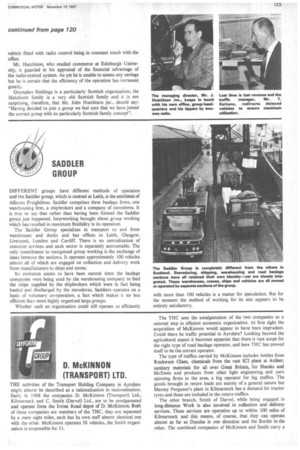
Page 126
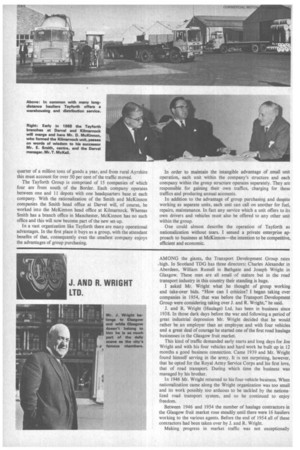
Page 127
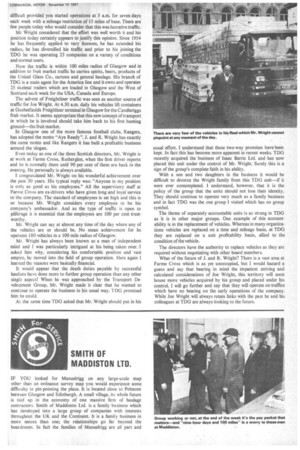
Page 128
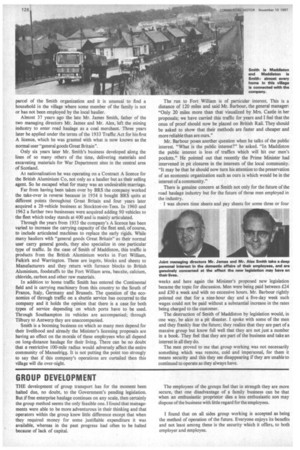
If you've noticed an error in this article please click here to report it so we can fix it.
promise
We led you to expect great things from Kelly Giant Radials. Such as the ability to run up to 100' cooler, a 30% reduction in fuel consumption and double the mileage of an ordinary tyre. Facts, which have since been proved unquestionably, by some of the biggest operators in the country. When Kelly make a promise about their tyres, you can be sure they'll keep it.
vehicle fitted with radio control being in constant touch with the office.
Mr. Hutchison, who studied commerce at Edinburgh University, is guarded in his appraisal of the financial advantage of the radio-control system. As yet he is unable to assess any savings but he is certain that the efficiency of the operation has increased greatly.
Grampian Holdings is a particularly Scottish organization; the Hutchison family is a very old Scottish family and it is not surprising, therefore, that Mr. John Hutchison jnr., should say: "Having decided to join a group we feel sure that we have joined the correct group with its particularly Scottish family concept".
DIFFERENT groups have different methods of operation and the Saddler group, which is centred at Leith, is the antithesis of Allisons Freightlines. Saddler comprises three haulage firms, one warehousing firm, a shipbrokers and a company of stevedores. It is true to say that rather than having been formed the Saddler group just happened. Interworking brought about group working which has resulted in maximum flexibility in its operation.
The Saddler Group specializes in transport to and from warehouses and docks and has offices in Leith, Glasgow, Liverpool, London and Cardiff. There is no centralization of common services and each sector is separately accountable. The only resemblance to recognized group working is the exchange of ideas between the sections. It operates approximately 100 vehicles almost all of which are engaged on collection and delivery work from manufacturers to ships and stores.
Its evolution seems to have been natural since the haulage companies were being used by the warehousing company to feed the ships supplied by the shipbrokers which were in fact being loaded and discharged by the stevedores. Saddlers operates on a basis of voluntary co-operation, a fact which makes it no less efficient than more highly organized large groups.
Whether such an organization could still operate so efficiently THE activities of the Transport Holding Company in Ayrshire might almost be described as a rationalization in nationalization. Early in 1968 the companies D. McKinnon (Transport) Ltd., Kilmarnock and C. Smith (Darvel) Ltd., are to be amalgamated and operate form the Irvine Road depot of D. McKinnon. Both of these companies are members of the THC, they are separated by a mere eight miles, each has its own staff almost identical one with the other. McKinnon operates 58 vehicles, the Smith organization is responsible for 31. The THC sees the amalgamation of the two companies as a rational step in efficient economic organization. At first sight the acquisition of McKinnon would appear to have been imprudent. Could there be traffic potential in Ayrshire? Looking beyond the agricultural aspect it becomes apparent that there is vast scope for the right type of road haulage operator, and here THC has proved itself to be the correct operator.
The type of traffics carried by McKinnon includes bottles from Rockware Glass, chemicals from the vast ICI plant at Ardeer, sanitary materials for all over Great Britain, for Shanks and McEwen and products from other light engineering and yarn spinning firms in the area, a big operator for big traffics. The goods brought in return loads are mainly of a general nature but Massey Ferguson's plant in Kilmarnock has a demand for tractor tyres and these are included in the return traffics.
The other branch, Smith of Darvel, while being engaged in long-distance Work is also involved in collection and delivery services. These services are operative up to within 100 miles of Kilmarnock and this means, of course, that they can operate almost as far as Dundee in one direction and the Border in the other. The combined companies of McKinnon and Smith carry a quarter of a million tons of goods a year, and from rural Ayrshire this must account for over 50 per cent of the traffic moved.
The Tayforth Group is comprised of 15 companies of which four are from south of the Border. Each company operates between one and 11 depots with one headquarters base at each company. With the rationalization of the Smith and McKinnon companies the Smith head office at Darvel will, of course, be worked into the McKinnon head office at Kilmarnock. Whereas Smith has a branch office in Manchester, McKinnon has no such office and this will now become part of the new set-up.
In a vast organization like Tayforth there are many operational advantages. In the first place it buys as a group, with the attendant benefits of that, consequently even the smallest company enjoys the advantages of group purchasing. In order to maintain the intangible advantage of small unit operation, each unit within the company's structure and each company within the group structure operates separately. They are responsible for gaining their own traffics, charging for these traffics and producing annual accounts.
In addition to the advantage of group purchasing and despite working as separate units, each unit can call on another for fuel, repairs, maintenance. In fact any service which a unit offers to its own drivers and vehicles must also be offered to any other unit within the group.
One could almost describe the operation of Tayforth as nationalization without tears. I sensed a private enterprise approach to business at McKinnon—the intention to be competitive, efficient and economic.
AMONG the giants, the Transport Development Group rates . high. In Scotland TDG has three directors: Charles Alexander in Aberdeen. William Russell in Bathgate and Joseph Wright in Glasgow. These men are all small of stature but in the road transport industry in this country their standing is huge.
I asked Mr. Wright what he thought of group working and take-over bids. "How can I criticize? I began taking over companies in 1954, that was before the Transport Development Group were considering taking over J. and R. Wright," he said.
J. and R. Wright (Haulage) Ltd. has been in business since 1938. In those dark days before the war and following a period of great industrial depression Mr. Wright decided that he would rather be an employer than an employee and with four vehicles and a great deal of courage he started one of the first road haulage businesses in the Glasgow fruit market.
This kind of traffic demanded early starts and long days for Joe Wright and with his four vehicles and hard work he built up in 12 months a good business connection. Came 1939 and Mr. Wright found himself serving in the army. It is not surprising, however, that he opted for the Royal Army Service Corps and his first love, that of road transport. During which time the business was managed by his brother.
In 1946 Mr. Wright returned to his four-vehicle business. When nationalization came along the Wright organization was too small and its work possibly too arduous to be tackled by the nationalized road transport system, and so he continued to enjoy freedom.
Between 1946 and 1954 the number of haulage contractors in the Glasgow fruit market rose steadily until there were 16 hauliers working to the various agents. Before the end of 1954 all of these contractors had been taken over by J. and R. Wright.
Making progress in market traffic was not exceptionally difficult provided you started operations at 5 a.m, for seven days each week with a mileage restriction of 15 miles of base. There are few people today who would consider that this was lucrative traffic.
Mr Wright considered that the effort was well worth it and his position today certainly appears to justify this opinion. Since 1954 he has frequently applied to vary licences, he has extended his radius, he has diversified his traffic and prior to his joining the TDG he was operating 23 companies on a variety of conditions and normal users.
Now the traffic is within 100 miles radius of Glasgow and in addition to fruit market traffic he carries spirits, beers, products of the United Glass Co., cartons and general haulage. His branch of TDG is a main agent for the America line and it owns and operates 25 skeletal trailers which are loaded in Glasgow and the West of Scotland each week for the USA, Canada and Europe.
The advent of Freightliner traffic was seen as another source of traffic for Joe Wright. At 4.30 a.m. daily his vehicles lift containers at Gushetfaulds Freighliner terminal in Glasgow for the Candleriggs fruit market. It seems appropriate that this new concept of transport in which he is involved should take him back to his first hunting ground—the fruit market.
In Glasgow one of the more famous football clubs, Rangers, has adopted the motto "Aye Ready". J. and R. Wright has exactly the same motto and like Rangers it has built a profitable business around the slogan.
Even today as one of the three Scottish directors, Mr. Wright is at work at Farme Cross, Rutherglen, when the first driver reports and he is normally there until 90 per cent of them are back in the evening. He personally is always available.
I congratulated Mr. Wright on his wonderful achievement over the past 30 years. His typical reply was: "Anyone in my position is only as good as his employees." All the supervisory staff at Farme Cross are ex-drivers who have given long and loyal service to the company. The standard of employees is set high and this is so because Mr. Wright considers every employee to be his company's ambassador. And as the type of traffic is open to pilferage it is essential that the employees are 100 per cent trustworthy.
Mr. Wright can say at almost any time of the day where any of the vehicles are or should be. No mean achievement for he operates 180 vehicles in a 100 mile radius of Glasgow.
Mr. Wright has always been known as a man of independent mind and I was particularly intrigued at his being taken over. I asked him why, considering his comfortable position and vast empire, he moved into the field of group operation. Here again I learned the reasons were basically financial.
It would appear that the death duties payable by successful hauliers have done more to further group operation than any other single aspect! When he was approached by the Transport Development Group, Mr. Wright made it clear that he wanted to continue to operate the business in his usual way. TDG promised him he could.
At the same time TDG asked that Mr. Wright should put in his IF YOU looked for Manueirigg on any large-scale map other than an ordnance survey map you would experience some difficulty in pin-pointing the place. It is located close to Polmont between Glasgow and Edinburgh. A small village, its whole future is tied up in the economy of one massive firm of haulage contractors. Smith of Maddiston Ltd. is a family business which has developed into a large group of companies with interests throughout the UK and the Continent. It is a family business in more senses than one; the relationships go far beyond the boardroom. In fact the families of Manuelrigg are all part and usual effort. I understand that these two-way promises have been kept. In fact this has become more apparent in recent weeks. TDG recently acquired the business of Isaac Barrie Ltd. and has now placed this unit under the control of Mr. Wright. Surely this is a sign of the group's complete faith in his ability.
With a son and two daughters in the business it would be difficult to divorce the Wright family from this TDG unit—if it were ever contemplated. I understand, however, that it is the policy of the group that the units should not lose their identity. They should continue to operate very much as a family business and in fact TDG was the one group I visited which has no group symbol.
The theme of separately accountable units is as strong in TDG as it is in other major groups. One example of this accountability is in the replacement of vehicles. Whereas in many organizations vehicles are replaced on a time and mileage basis, at TDG they are replaced on a unit profitability basis, allied to the condition of the vehicle.
The directors have the authority to replace vehicles as they are required without negotiating with other board members.
What of the future of J. and R. Wright? There is a vast area at Farme Cross which is as yet unoccupied, but I would hazard a guess and say that bearing in mind the impatient striving and calculated considerations of Joe Wright, this territory will soon house more vehicles acquired by his group and placed under his control. I will go further and say that they will operate on traffics which have no bearing on the early operations of the company. While Joe Wright will always retain links with the past he and his colleagues at TDG are always looking to the future. parcel of the Smith organization and it is unusual to find a household in the village where some member of the family is not or has not been employed by the local haulier.
Almost 37 years ago the late Mr. James Smith, father of the two managing directors Mr. James and Mr. Alex, left the mining industry to enter road haulage as a coal merchant. Three years later he applied under the terms of the 1933 Traffic Act for his first A licence, which he was granted with what is now known as the normal user "general goods Great Britain".
Only six years later Mr. Smith's business developed along the lines of so many others of the time, delivering materials and excavating materials for War Department sites in the central area of Scotland.
At nationalization he was operating on a Contract A licence for the British Aluminium Co, not only as a haulier but as their selling agent. So he escaped what for many was an undesirable marriage.
Far from having been taken over by BRS the company worked the take-over in reverse because in 1954 it bought BRS units at different points throughout Great Britain and four years later acquired a 28-vehicle business at Stockton-on-Tees. In 1960 and 1962 a further two businesses were acquired adding 90 vehicles to the fleet which today stands at 400 and is mainly articulated.
Through the years from 1933 the company's A licence has been varied to increase the carrying capacity of the fleet and, of course, to include articulated machines to replace the early rigids. While many hauliers with "general goods Great Britain" as their normal user carry general goods, they also specialize in one particular type of traffic. In the case of Smith of Maddiston, this traffic is products from the British Aluminium works in Fort William, Falkirk and Warrington. These are ingots, blocks and sheets to Manufacturers and they return with furnace blocks to British Aluminium, foodstuffs to the Fort William area, bauxite, calcium, chloride, carbon and other raw materials.
In addition to home traffic Smith has entered the Continental field and is carrying machinery from this country to the South of France, Italy, Germany and Brussels. The question of the economics of through traffic on a shuttle service has occurred to the company and it holds the opinion that there is a case for both types of service depending on which ports have to be used. Through Southampton its vehicles are accompanied; through Tilbury to Antwerp they are unaccompanied.
Smith is a booming business on which so many men depend for their livelihood and already the Minister's licensing proposals are having an effect on the morale of these employees who all depend on long-distance haulage for their living. There can be no doubt that a restrictive 100-mile radius would adversely affect the entire community of Manuelrigg. It is not putting the point too strongly to say that if this company's operations are curtailed then this village will die over-night.
The run to Fort William is of particular interest. This is a distance of 120 miles and said Mr. Barbour, the general manager: "Only 20 miles more than that visualized by Mrs. Castle in her proposals; we have carried this traffic for years and I feel that the onus of proof should now be placed on British Rail. They should be asked to show that their methods are faster and cheaper and more reliable than are ours."
Mr. Barbour poses another question when he talks of the public interest. "What is the public interest?" he asked. "In Maddiston the public interest is loss of traffics which will hit our men's pockets." He pointed out that recently the Prime Minister had intervened in pit closures in the interests of the local community. "It may be that he should now turn his attention to the preservation of an economic organization such as ours is which would be in the interest of a community."
There is genuine concern at Smith not only for the future of the road haulage industry but for the future of those men employed in the industry.
I was shown time sheets and pay sheets for some three or four
Joint managing directors Mr. James and Mr. Alex Smith take a deep personal interest in the domestic affairs of their employees, and are genuinely concerned at the effect the new legislation may have on their lives.
weeks and here again the Minister's proposed new legislation became the topic for discussion. Men were being paid between £24 and £30 a week and with no excessive hours. Mr. Barbour rightly pointed out that for a nine-hour day and a five-day week such wages could not be paid without a substantial increase in the rates being charged to the customer.
The destruction of Smith of Maddiston by legislation would, in one way, be akin to a pit disaster. I spoke with some of the men and they frankly fear the future; they realize that they are part of a massive group but know full well that they are not just a number in a book. They feel that they are part of the business and take an interest in all they do.
The men proved to me that group working was not necessarily something which was remote, cold and impersonal, for them it means security and this they see disappearing if they are unable to continued to operate as they always have.




































































































































































































































































